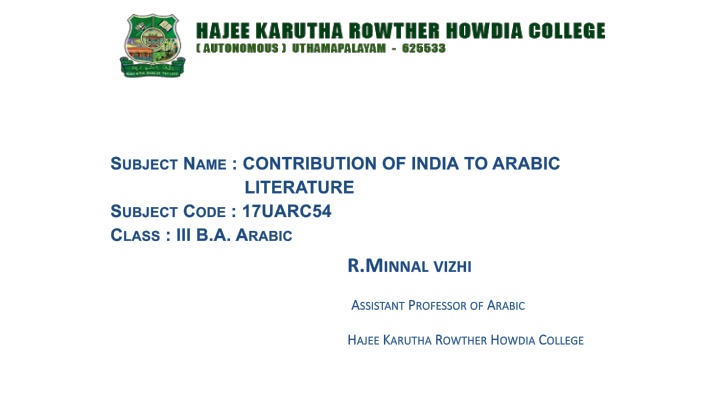
Contribution of Indian Scholars to Arabic Literature
Explore the significant contributions of Indian scholars to Arabic literature, focusing on the life and works of S.S. Muhammad Abdul Khader and Muhammad Anwar Shah Kashmiri. Learn about their translations of Quranic texts, Hadith, and Islamic books, as well as their impact on Tamil commentary and education. Delve into the rich literary legacy they have left behind.
Download Presentation

Please find below an Image/Link to download the presentation.
The content on the website is provided AS IS for your information and personal use only. It may not be sold, licensed, or shared on other websites without obtaining consent from the author. If you encounter any issues during the download, it is possible that the publisher has removed the file from their server.
You are allowed to download the files provided on this website for personal or commercial use, subject to the condition that they are used lawfully. All files are the property of their respective owners.
The content on the website is provided AS IS for your information and personal use only. It may not be sold, licensed, or shared on other websites without obtaining consent from the author.
E N D
Presentation Transcript
SUBJECT NAME : CONTRIBUTION OF INDIA TO ARABIC LITERATURE SUBJECT CODE : 17UARC54 CLASS : III B.A. ARABIC R.MINNAL VIZHI A ASSISTANT SSISTANT P PROFESSOR OF A ARABIC RABIC ROFESSOR OF H HAJEE AJEE K KARUTHA ARUTHA R ROWTHER OWTHER H HOWDIA OWDIA C COLLEGE OLLEGE
Life and works of S.S.Muhammad Abdul Khader The eminent Scholar who played a vital role in the writing of the first Tamil commentary of the Quran, S.S.Muhammad Abdul Kadher Baqawi was born in Uthamapalayam in 1901. He pursued his religious education at the Howdia Madrasa established in 1910 by Hajee Karutha Rowther, a great philanthropist and educationist. The strong foundation of religious education provided by Howdia Madrasa helped him to emerge as an eminent scholar from Baqiathus Salihath, Vellore in 1917. When asked by his teacher Hazrath Abdul Ali what kind of service to Islam he would render on graduation as a scholar (aalim) he had replied that he would translate the Quran, the Hadith and all Islamic books to Tamil and this is what he did for the rest of his life.
He has written on a range of topics from Tafsir, Hadith, Fiqh, Seerath and Tasawuff. Though the first Tamil Tafsir of Quran was written by A.K. Abdul Hameed Baqawi, S.S. Abdul Kadher Baqawi had contributed a lot to it. His book Tafsirul Hameed fi Tasirul Quranil Majid, which consisits of over seven thousand pages was published in seven volumes between 1937 and 1961. Besides word to word translation and commentaries, the reasons behind revealation of Verses, Hadith pertaining to them, historical events, Islamic principles, Islamic laws and rules of grammar are discussed in detail in his work. He was also the first to translate the Hadith book of Imam Buhari into Tamil. He later translated Sahih Muslim a book of Hadith written by Imam Muslim into Tamil. He has also written a biography of the Prophet in Tamil with authentic references to books published on the same in Arabic. He later served as a teacher in the Howdia Madrasa at Uthamapalayam, his alma mater.
The following are some of the books written by him: Ishavathul Hasanath fi Tharjumathil Baqiyathus Salihath Thirumarai Tamizhurai Tafseerul hameed fi Tafseeril Quranil Majeedh Thuhfathus Saliheen Al Anwaar Jawahirul Buhari Tajreedhul Jamiyis Saheehul Buhari Kanzun Dhaqaiq Bidayathul Hidaya Sahih Muslim Tareeqathul Athasiya Arkanul Islam Tafsir Surathul Yasin
MUHAMMAD ANWAR SHAH KASHMIRI Anwar Shah Kashmiri was born on November 26, 1875. At the age of four and a half years he started reading the Holy Quran under the instruction of his father, Maulana Syed Muazzam Ali Shah. He was fourteen years old when he left for Madhrasa of Hazara.In 1893 he came to Deoband. Then, in 1896 he went to Rashid Ahmad Gangohi and besides obtaining a Sanad (certificate) of Hadith, he also acquired esoteric knowledge. After graduating from Darul Uloom he taught for some time in Madhrasa Aminia, Delhi. In 1903, he went to Kashmir and opened a Madhrasa named Faiz-e A'am in his district. He came back to Deoband in 1909 and went on to teach Hadith without salary. He held the guardianship of Darul Uloom for nearly twelve years. After this, in 1927, he went to the Madhrasa of Dabhel in western India, where he resumed teaching Hadith till 1932. In 1933, he became ill and traveled to Deoband for medical care. He continued addressing students there until the day he breathed his last on May 28, 1933.
WORKS OF ANWAR SHAH KASHMIRI: If anybody tries to misinterpret the Quran, his Mushkilatul Quran is there to defend the Quran. For those who misconstrue the Ahadith, his famous Arabic book Faydh al-Bari and the Urdu book Anwarul Bari, both commentaries of Saheeh Al-Bukhari, are there to shield the sayings of our Prophet . His book on Islamic jurisprudence in the light of Imam Abu Hanifa s school of thought has gained him a permanent place of respect and honor in the hearts of all Hanafis. He has expressed his loyalty to the Seal of all Prophets by writing Khatimun Nabi een. He has proved to all Christians of the world that the real admirers of Jesus the Son of Mary are the Muslims. He rebuffed the claims of the false Messiah of Qadian by writing Aqeedatul Islam fi Hayatul Eisa Alayhis Salam and At-Tasreeh bi ma Tawattar fi Nazool al-Maseeh .
His students have reported that the words "Hasbuna-Allah" (meaning "Allah suffices for us") would always be on his tongue. How fortunate were people like Mufti Muhammad Shafi, Maulana Muhammad Idris Kandhlavi, Maulana Badr Alam Merathi, Maulana Syed Manazir Ahsan Gilani, Maulana Yusuf Binori, Maulana Hifzur Rahman Seuhari, Mufti Muhammad Hasan Amritsari, Maulana Ather Ali Silhati, and Qari Muhammad Tayyib Qasmi to satisfy their natural thirst for divine wisdom from this marvelous fountain of knowledge and illumination. His students saw in his practice all those teachings that were in his speeches and lessons. The student that benefited most from the teachings of Anwar Shah Kashmiri was Allama Shabir Ahmad Usmani, who would turn towards him at times of academic difficulties and pursue his research day and night. He has extensively drawn from Hadhrat Shah Saheb in his commentary of the Noble Quran (Tafseer-e-Usmaani) and his celebrated work Fat h al-Mulhim (commentary of Saheeh Muslim)" (Anwarul Bari, v.2, p.234).




